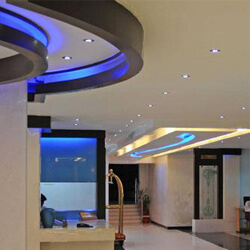
False Ceiling
Our organization has set benchmark in providing Commercial False Ceiling to the clients. This Commercial False Ceiling is manufactured by using premium grade raw material and components, which is sourced from trusted vendors of the industry. This is also available in various customized options as per client’s requirements.
 Commercial False Ceiling
Commercial False Ceiling
Our organization has set benchmark in providing Commercial False Ceiling to the clients. This Commercial False Ceiling is manufactured by using premium grade raw material and components, which is sourced from trusted vendors of the industry. This is also available in various customized options as per client’s requirements.
 Grid False Ceiling
Grid False Ceiling
Our company is widely appreciated in providing Grid False Ceiling to the clients. This Grid False Ceiling is done by compliance with the highest standards of quality using advanced technologies and quality raw material. It is highly demanded by our various clients for its excellent quality.
False Ceiling Solutions
Ceilings offer the largest unobstructed view of a room and are the first thing people usually notice when they enter a building. As a result, the ceiling is an important element of room design and defines it's aesthetics. Since a ceiling has a large surface area, it plays an important role in the acoustic and thermal comfort of a room.
Finex Touch Interior is a pioneer and world leader in false ceilings and offers a wide range of options:
- Gypsum plasterboard-based false ceilings
- Ecophon acoustic ceiling tiles (made of glass wool)
- Grid ceiling tiles using materials as diverse as gypsum, mineral fibre and metal
Benefits of Gyproc False Ceilings
Finex Touch Interiors false ceilings are the preferred choice of discerning customers because they offer several benefits, including:
- Better aesthetics and designs
- Concealment of wires and services, reducing visual clutter
- Superior thermal insulation, reducing heat
- Lower power costs because of reduced air-conditioning loads
- Better acoustic comfort by reducing noise
Types of Ceiling Systems
- Gypsum Plasterboard False Ceilings System
- Ecophon Ceiling Tiles False Ceiling System
- Grid Ceiling Tiles False Ceiling System
- Gyptone Ceiling
Drywall Solutions
.jpg)
A drywall is a highperformance lightweight interior wall system consisting of a GI steel frame, encased in gypsum plasterboards on either side attached with self-drilling drywall screws. The joints are then taped and finished with gypsum jointing compounds.
Drywalls can be used to partition any interior and are the preferred choice of construction for a range of applications, in homes, hotels, hospitals, schools, theatres, and industry. They are strong and robust (drywalls of up to 15 metres high have been built) and can typically last the lifetime of a building unless they are subjected to abuse or alteration.
Benefits of Drywall
Dry Construction – Consumes 95% less water than masonry construction.
Speed of Installation – 3 to 4 times faster than masonry construction.
Light Weight – 8 to 10 times lighter than masonry system.
Flexiblity – In creating and dividing spaces according to your needs.
Excellent Performance – In terms of fire protection and sound insulation
Aesthetic Appeal – Seamless and crack free surfaces, allowing ease of decoration via paint, tiles or wallpaper.
Environment Friendly – Green Product which is recyclable and is made of environment friendly material.
Different Types of Drywalls
1. Drylining System:
Gyproc Drylining provides an excellent level of finish for buildings. The lining can be used for the internal surfaces of external walls and are equally suited for both new construction and refurbishment. The wall lining enhances the thermal, sound and fire insulation of masonry walls.
Drylining can be of two types:
- Gypliner-based systems, where an adjustable bracket is fixed to the masonry wall on which plasterboard is screwed and finished.
- Plaster dab systems, where a gypsum plaster dab is applied across the masonry wall at uniform intervals and the gypsum plasterboard is then stuck on to it.
2. Interior Partitions:
Gypsum-based partitions are used extensively to efficiently create and divide spaces in offices. These partitions are easy and quick to build, provide excellent acoustic insulation (preventing sound from moving from one room to another), good fire protection and can take all types of finishes (from paint to wallpaper to wooden laminates and veneers). They are a superior cost-effective alternative to conventional masonry walls which take long to build and are not flexible; and wooden partitions, which pose a fire hazard, offer poor sound insulation and are expensive.
3. Performance Drywalls:
Gypsum-based performance drywalls are used to separate rooms and spaces in homes, hotels, hospitals, multiplexes and industrial complexes. Apart from offering the conventional benefits of fast and easy construction, they also offer high performance in terms of:
- Sound insulation (50db to 70db)
- Passive fire protection (one to four hours)
- Strength (Severe duty)
Conventional masonry construction needs walls that are much thicker to achieve such performance, and the process is laborious and time-consuming.
4. Wet Area Drywalls:
Specialised drywall solutions are available for interior wet area applications (like bathrooms and kitchens), which use special boards like Gyproc Moisture Resistant gypsum board or Gyproc fibre cement board. These offer superior moisture resistance properties and also the flexibility to fix:
- Ceramic tiles up to 32kg/m2 using suitable adhesive
- Heavier marble /granite using a combination of dry and wet fixing





